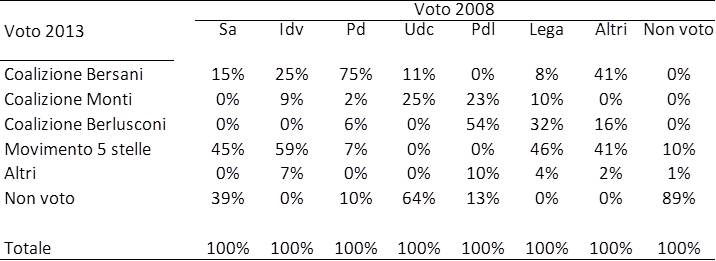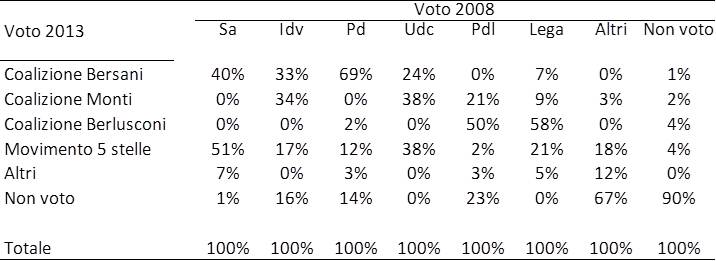di Aldo Paparo e Matteo Cataldi
Presentiamo qui le matrici dei flussi elettorali fra politiche 2008 e 2013 in tre importanti città lombarde: Monza, Pavia e Varese. A cinque anni di distanza il centrodestra si è confermato prima coalizione in questi tre capoluoghi, seppur in forte calo: da circa la metà a circa un terzo dei voti validi. Percentualmente si tratta di contrazioni fra i 17 e i 21 punti. In particolare il Pdl ha perso 15 punti percentuali in tutti e tre i casi, mentre le perdite della Lega si sono mantenute fra i 6 e gli 8 punti. Lo stesso è accaduto nella regione nel suo complesso. L’anno scorso però le comunali di Monza avevano visto una clamorosa vittoria del centrosinistra contro un centrodestra diviso: il candidato berlusconiano era rimasto al di sotto del 40% al ballottaggio mentre il sindaco leghista uscente Mariani aveva raccolto appena il 10% al primo turno.
Come il centrodestra, anche la coalizione guidata da Bersani ha subito un arretramento rispetto ai risultati ottenuti cinque anni fa, ma più contenuto: tra i 4 e i 5 punti. Tale risultato è in linea con il resto della regione. Monti ha aumentato i voti dell’Udc 2008 fra i 9 e i 10 punti percentuali, facendo di poco meglio rispetto a quanto registrato in tutta la Lombardia. Completa il quadro M5s che ha raccolto fra il 16,2 e il 18,7% dei voti, con una leggera flessione rispetto al risultato regionale.
Le tabelle 1, 2 e 3 riportano le matrici di flussi fra 2008 e 2013 per le città analizzate. Il Pd presenta i valori di fedeltà più elevati, sempre abbondantemente al di sopra del 50%. Dobbiamo però segnalare come una frazione mai inferiore al 10% si sia astenuta. Per il resto non si segnala alcun altro rilevante movimento in uscita dal bacino 2008, con l’eccezione di quello a favore del M5s a Pavia (22%).
Il Pdl non subisce defezioni verso il M5s ma cede circa un quinto degli elettori 2008 alla coalizione di Monti. Inoltre vi sono perdite altrettanto significative verso il non voto, seppur maggiormente diversificate nei tre casi. Non viene stimato passaggio diretto a vantaggio di Bersani. I tassi di riconferma del Pdl sono quindi compresi tra il 41 e il 54%. La Lega presenta tassi di riconferma caratterizzati da una maggiore variabilità, fra un terzo e i tre quinti degli elettori 2008. Contrariamente al principale alleato, perde (e molto) verso il M5s ma non verso l’astensione. Questa permeabilità dell’elettorato del Carroccio alla penetrazione grillina conferma quanto già emerso in occasione delle elezioni comunali dello scorso anno.
I tre quarti degli elettori Udc 2008 non hanno votato la coalizione di Monti, solo a Varese la porzione che ha scelto il premier uscente è stata un po’ più grande, ma comunque inferiore ai due quinti. Le fuoriuscite risultano piuttosto diverse di città in città: in massa verso l’astensione a Monza, a metà fra Bersani e Berlusconi a Pavia e principalmente verso il M5s a Varese.
L’elettorato 2008 che presenta le maggiori defezioni verso il M5s è quello della Sinistra Arcobaleno: la metà circa in tutti e tre le città.
Tab. 1 – Flussi elettorali a Monza: destinazioni 2013 degli elettorati 2008 dei vari partiti
Tab. 2 – Flussi elettorali a Pavia: destinazioni 2013 degli elettorati 2008 dei vari partiti.
Tab. 3 – Flussi elettorali a Varese: destinazioni 2013 degli elettorati 2008 dei vari partiti.
Una delle domande più interessanti cui è possibile rispondere attraverso la lettura dei flussi è cosa avessero votato nel 2008 coloro che oggi hanno scelto il M5s. La tabella 4 riporta la composizione percentuale dell’elettorato grillino nei nostri tre casi. Come si può osservare, le quote più rilevanti provengono da ex-elettori della Lega nord. Fa eccezione Pavia dove quasi la metà aveva scelto Veltroni cinque anni fa. A Monza e Varese i voti in entrata dal Pd valgono invece solo il 12% e il 23% dell’elettorato grillino totale.
Dalla Sinistra arcobaleno proviene una quota fra il 7 e il 10%. Come già visto, il Pdl si è rivelato il partito più capace di resistere all’avanzata del M5S: solo a Varese una piccola frazione dei movimentisti proviene da qui (uno su venti).
Guardando complessivamente alla composizione dell’elettorato del M5s, sono in maggioranza ex elettori di centrosinistra i grillini di Pavia, più ex berlusconiani (leghisti) quelli di Monza, in parti uguali fra le due coalizioni a Varese.
Infine, il bacino del M5s si alimenta di una quota consistente di rimobilitati, cioè coloro che in occasione delle precedenti politiche si erano astenuti: da questi arriva fra l’8 e il 14% dei suoi voti.
Tab. 4 – Provenienze 2008 degli elettori 2013 del M5s nei capoluoghi analizzati.
Riassumendo, sottolineiamo la maggior tenuta del Pd: nei tre casi analizzati, il suo tasso di fedeltà è superiore al massimo dei due principali partiti del centrodestra. Inoltre abbiamo osservato due distinte tendenze all’interno della coalizione berlusconiana. Il Pdl ha ceduto verso Monti quote rilevanti, mentre i suoi delusi più periferici hanno preferito astenersi. Al contrario i leghisti, scontenti dell’alleanza col Pdl o delusi generici, hanno preferito votare per il M5s. Completano il successo grillino i voti ottenuti dal centrosinistra, bacino che invece si è dimostrato refrattario alla proposta di Monti.



